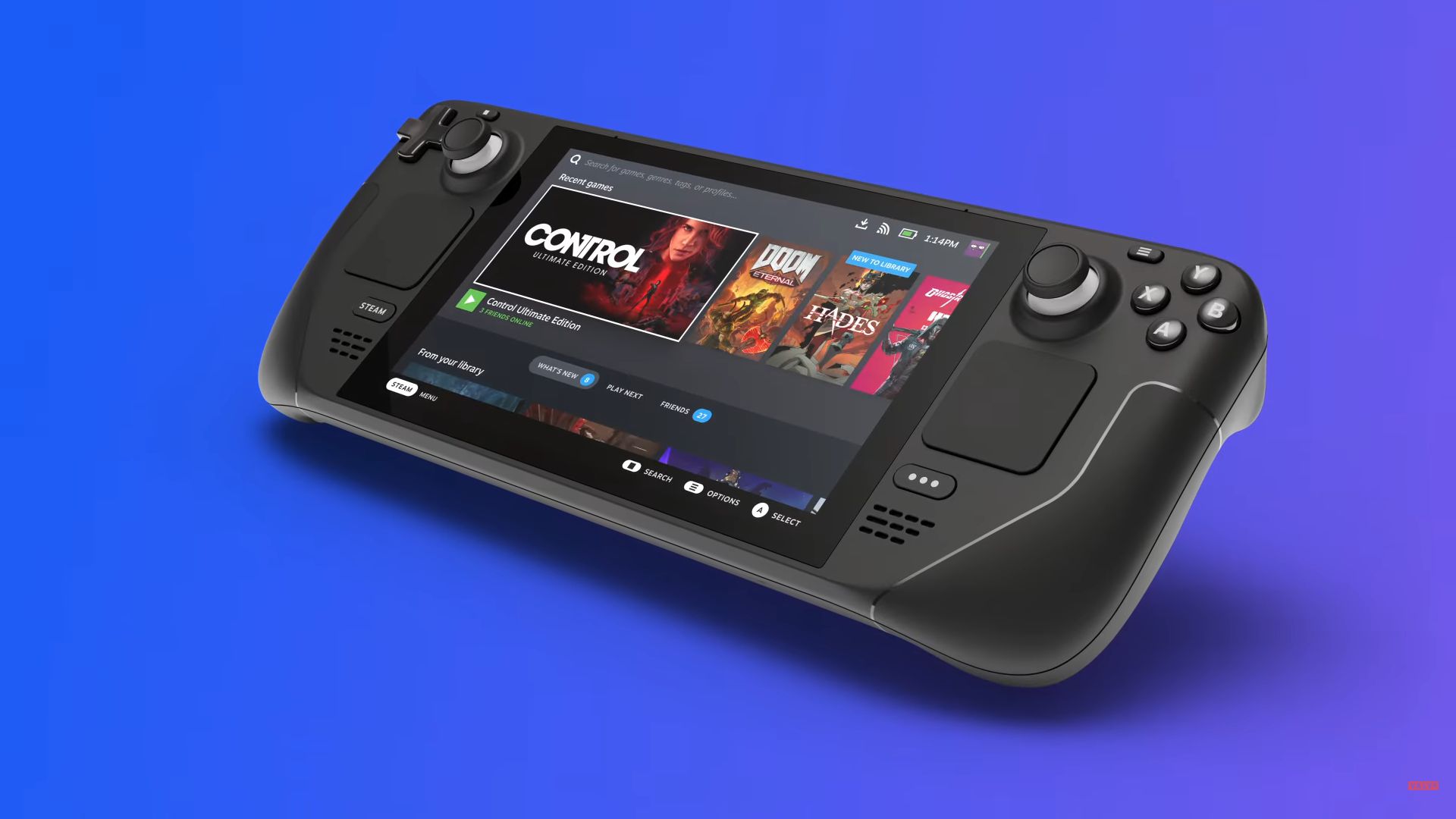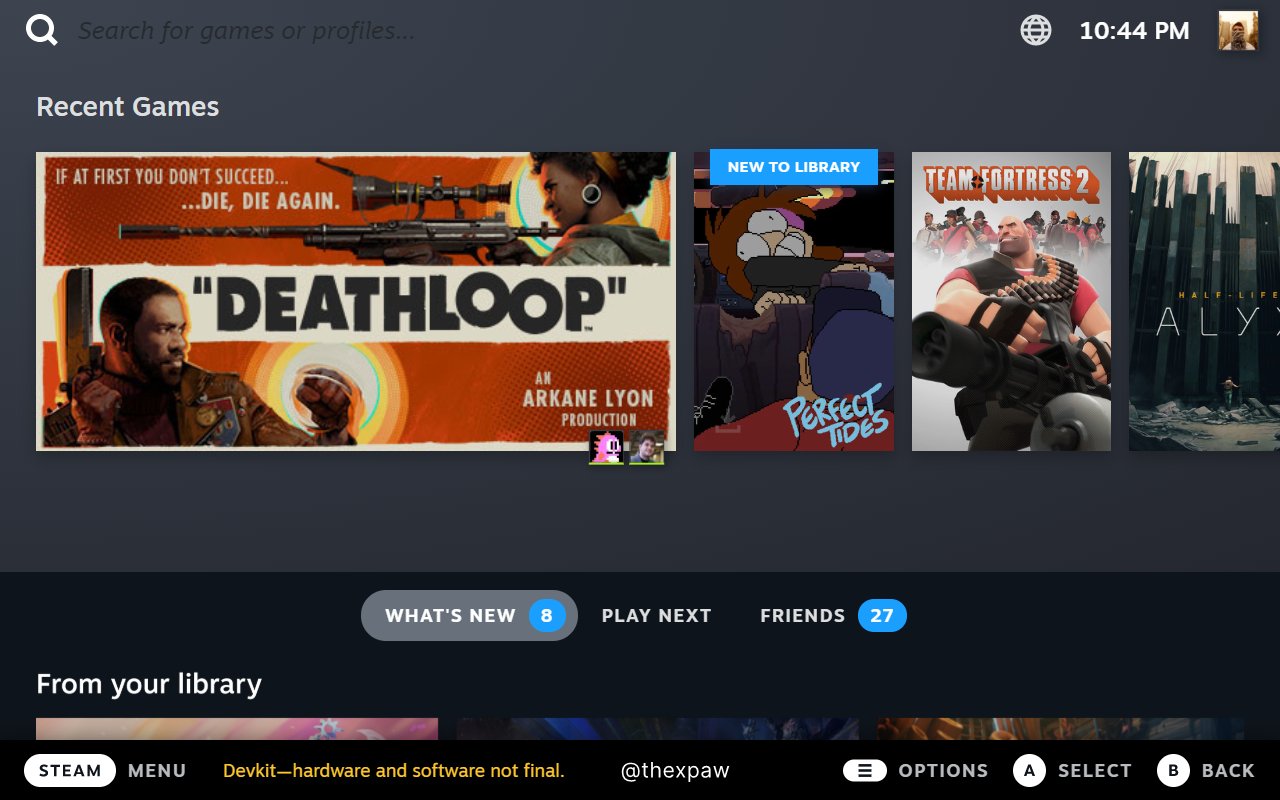2022 will be the year of the Steam Deck
This year Valve's handheld may well change PC gaming as we know it.

Apple isn't a bajillion-dollar tech juggernaut today because it comes up with ideas first. Apple didn't invent the MP3 player, but the iPod dominated because it had a better design, better aesthetics, and better ads. Apple didn't invent the smartphone, but the iPhone crushed its nascent competitors with better hardware and a brilliant touch interface. Being first never mattered as much as flexing those brand and design muscles to make everyone else look old and busted.
I think that Valve has a shot at its own iPod moment in 2022. The Steam Deck isn't the first portable gaming PC, but it might be the one that changes everything.
Or at least, it might change everything for PC gaming. The iPod is probably an impossible bar to reach for broader cultural impact, and the Nintendo Game Boy and DS have already defined the types of portable games we played for a decade, anyway. But the pieces for a sea change moment for the PC, specifically, are all aligned this year. The Steam Deck isn't just a promising piece of hardware. It's also coming out at an opportune time when PC gaming is out of reach for many people.
The brand power is definitely there: Steam saved PC games from languishing in the dreary disheveled aisles of Walmarts and Best Buys, becoming the platform that even Microsoft and Sony use to publish their own PC games. The PC already won the console war, so why not go all the way and make the PC a console? It's been tried before, but never by a company with Valve's resources or name recognition.
Up to this point, handheld gaming PCs like the GPD Win have tried to shrink the laptop experience down to something more pocket-sized, but it's never been an ideal setup. Windows isn't built for those tiny screens; the performance overhead sucks for portable systems where every ounce of power matters; and who really wants to use Windows on a gaming system that's supposed to be pick-up-and-play simple, anyway? Getting games working on these devices has long been an arcane process of sussing out driver and compatibility issues.
Valve's near-monopoly over game distribution has put it in a good position to stamp out most of that fiddling. With Linux, Valve can erase the most obvious drawbacks of playing PC games on an OS that was never built to be portable. On the Steam Deck there's no Windows bloat, no wrestling with an awkward interface. If Proton—the tool Valve developed to convert Windows games to Linux on the fly—works as seamlessly as promised, less tech-savvy gamers won't even notice it. They'll just turn on the Steam Deck and play games.
To them, the Deck won't be running on Linux. It'll just be running Steam.
The biggest gaming news, reviews and hardware deals
Keep up to date with the most important stories and the best deals, as picked by the PC Gamer team.

That convenience is the key thing handheld gaming PCs have been missing until this point. And convenience shouldn't be underestimated. When Nintendo released the Switch, it managed to draw people away from the places they were already playing games. Many PC gamers knew they could get a game cheaper on Steam, but opted to buy and play it on the Switch instead for the portability. Some games just felt right on the Switch's screen, played propped up in bed or on the go. The Switch was an ideal companion for a gaming PC, but now the Steam Deck can fill that role.
In one sense Valve is selling the Steam Deck at a difficult time—global hardware shortages already forced Valve to push the launch back by a few months, while graphics cards and some other components remain in critically short supply. 2021 was a bad year for PC gaming hardware. But the continued shortages could also end up being an opportunity. A $529 Steam Deck looks pretty good next to an $800 RTX 3060 someone's trying to flip on Ebay. Pre-ordering the Steam Deck could mean a long wait, but Valve's Greg Coomer told me in August that "It's our job to produce units as fast as we can in the highest quantity we can, so a lot of us are working on how we can make more Steam Decks. That has become our focus."
The Steam Deck's biggest audience will still likely be PC gamers who use it as a secondary device, as a more convenient way to plow through their backlogs of Steam Sale games away from their desks. But if component shortages stretch on, it may well become a more attractive first or only PC.
And at least in terms of power, it's the Switch Pro many people were hoping to see last year when Nintendo disappointingly just slapped a bigger OLED screen onto the Switch. I'd be silly to suggest the Steam Deck will suddenly outsell the Switch—raw power has never been enough to beat a Nintendo handheld.
Still, the timing is good for the Steam Deck. Outside of Nintendo exclusives, there's barely a distinction between "console games" and "PC games" anymore—most games today are released on as many platforms as possible. Steam's gargantuan library includes PC games from 30 years ago and Sony's God of War side-by-side. The Switch has primed millions of players to appreciate console-quality games made portable, but many of those games like Apex Legends and Ark: Survival Evolved now run at such low resolutions or low framerates that they're barely playable.
The Switch cannot play big budget games released in 2022 without massive sacrifices. The Steam Deck can.
Maybe I'm overestimating the Steam Deck's chances. Looking back, Valve's previous hardware experiments mostly failed. Valve's play for the living room with Steam Machines was an infamous flop; the Steam Controller never caught on; its VR headsets remain too expensive to approach Oculus's popularity. But none of those devices really had a proven audience eager and waiting for them—or a pitch as strong as playing all your PC games on the go, without the sacrifices of all those previous handheld PCs. And the SteamOS software that held back Steam Machines in 2014 may have matured enough to now be Valve's ace in the hole.
Even if the Steam Deck doesn't shake the foundations of PC gaming enough to pull most PC gamers away from their desktops, a modest success could still be transformative for Valve. There's never been a single device or brand synonymous with PC gaming. The Steam Deck could easily become that: the go-to PC if you want to spend $500 or care about portability, and the first in a product line that could bring millions more players to Steam. If 2022 is the year of the Steam Deck, then 2023 will be the year we see Valve's decade of dabbling with hardware evolve into its biggest priority.

Wes has been covering games and hardware for more than 10 years, first at tech sites like The Wirecutter and Tested before joining the PC Gamer team in 2014. Wes plays a little bit of everything, but he'll always jump at the chance to cover emulation and Japanese games.
When he's not obsessively optimizing and re-optimizing a tangle of conveyor belts in Satisfactory (it's really becoming a problem), he's probably playing a 20-year-old Final Fantasy or some opaque ASCII roguelike. With a focus on writing and editing features, he seeks out personal stories and in-depth histories from the corners of PC gaming and its niche communities. 50% pizza by volume (deep dish, to be specific).

